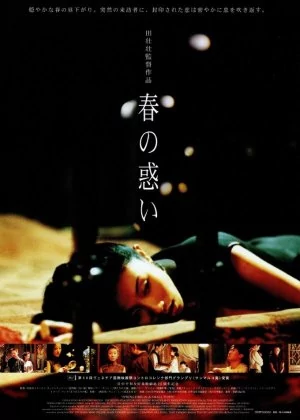Springtime in a Small Town

Springtime in a Small Town [Xiao Cheng Zhi Chun] is the film that introduced me to the work of Zhuangzhuang Tian. It's one of the first films that sparked my interest in Chinese cinema, even though it isn't the type of cinema I would usually fall for. I haven't seen the original yet (a 1948 Chinese classic that goes by the same name), but that's hardly an issue when a director's style dominates a film so wholesomely.

Zhuangzhuang Tian (Lang Zai Ji) is probably the epitome of mainland China's arthouse cinema. His films are often characterized by slow pacing, rural settings and classic Chinese values. And yet his films are never too depressing or heavy-handed. There's a certain beauty that shines through from underneath the seams, even when the subject matter may be a little grim (or at least inaccessible to Western people).
I feel Springtime in a Small Town is the type of film that reflects what you (as a viewer) bring into it. While checking out online reviews I've seen many people refer to it as a depressing and frustrating experience. Even though personally I can't relate, it's not too hard to see where this critique is coming from. The love triangle that sits at the core of the film is handled in a very "Chinese" way, an approach no Western romance would ever dream of following. Once you're at ease with the Chinese morals though, there is plenty to enjoy.
The film follows Liyan and Yuwen, a young couple surviving in a torn down estate Liyan inherited from his parents. While the rest of the village became uninhabitable, the Dai estate survived the destruction of war. The times are harsh, but a surprise visit by Zhang, Liyan's childhood friend, brightens the atmosphere in the estate. What Liyan doesn't know is that Zhang is an old flame of Yuwen. When the two meet up again, their old love rekindles and a precarious situation develops.

Stylistically Springtime in a Small Town is top notch. Even though the colors can be a bit murky and some scenes appear to be a little too dark, the camera work is elegant and subtle while the framing is nothing less than exquisite. Nothing seems left to chance, every minuscule movement feels planned and controlled. It's a visual elegance that reflects the choices the characters make during the film and it helps to ease in the viewer.
It's the soundtrack that's the real winner here though. It has a very unique quality I haven't really experienced in any other film. At first glance there's only a pretty simple yet beautiful combination of ambient piano music running underneath the entire film. But if you check back you'll notice many scenes don't feature any actual music at all. Still, the soundtrack lingers and seems to sustain itself even during the scenes that have no additional musical support. Strange indeed, but very entrancing and absolutely magical. When Tian finally pulls out a more conventional track (at the start of the end credits) the effect is devastatingly beautiful.
The acting is solid, even when most actors don't have too much liberty to shine. The film has a small cast (five actors in total) and while they all do a good job the acting can be a little too static at times. I realize it's supposed to supplement the rigid morals of the characters (excluding Liyan's younger sister, who's much franker than the others), but comparing it to the middle section of Zui Hao De Shi Guang I feel there's a definite gap in quality that could've been bridged a little better.

Springtime in a Small Town is a film that explores the slumps in a marriage. While the couple is going through a tough time, a third person presents itself as a welcome diversion. If this had been a Western romance/drama there would've been passionate nights, remorse and a lot of kissing and fondling, but as this is the Chinese variant the film is more about cropped up passion and respect. The choices of the characters may appear a little abstract if you haven't seen too many Asian dramas, but the motivations are always clear, even if they might be a bit difficult to relate too for some people. It's a matter of preference no doubt, I for one appreciate this approach a hell of a lot more.
The progression from winter to spring is clearly positive, so unless you're completely stumped by the actions of the characters I see little motivation to call this a depressing film. It's a slow burner though, with not too much going on but the tension building up between the different characters. It's also quite long for such a slow-paced film, but the sublime soundtrack and the elegant visuals are more than enough to entrance you into the simple dilemma that lies at the core. Springtime in a Small Town is a stunning, subtle and elegant experience that serves as a perfect introduction to Tian's body of work.